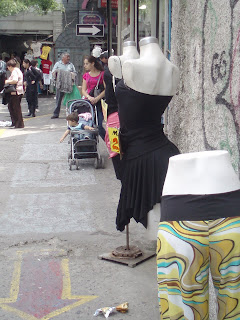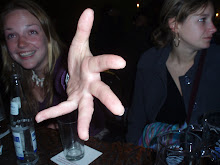 It had been months since I'd been in a city, and my traveling companion, the lovely Argentinian Florencia, was so amused by my reaction that she needed to document it.
It had been months since I'd been in a city, and my traveling companion, the lovely Argentinian Florencia, was so amused by my reaction that she needed to document it.Returning to last Saturday. I bought myself a gigantic cup of coffee and sat reading my book and eating a croissant. As my hangover cleared a bit, I was able to navigate my way to the counter once again. I purchased a large French press and a pound of ground coffee. If I can dig up my crossword puzzle book from the plane last February, my next day off will be a delight.
It was very strange to be in a North American institution. As is the Starbucks way, everything is standardized, so the store was decked out in Christmas decorations and resounding with carols. Nevermind that Chileans are not overly excited by Christmas, nor can they spell the word in English.

It was strange to be sitting in air-conditioning, wearing a t-shirt, surrounded by red and green ornamentation. My Chilean friends tell me that it is odd even for them, having at this point absorbed much of the northern imagery associated with the holiday. "How bizarre," they tell me, "to have Santa Claus walking around in furs in 80 degree weather!" This will be my first Southern hemisphere Christmas, and I will be missing the snows of Boston.

From Starbucks, I headed to Patronato. The night before, I had advised the mother of an acquaintance that I had this intention. She was accepting, but concerned. "You need to go with only one small purse, and have it all the way up on your shoulder and under your arm."
She also told me not to walk around obliviously, and demonstrated with a duck-footed, wide-eyed pantomime.
As always, I give little creedence to Chilean prophecies of doom. The populace has been inundated with documentaries about the peligro that lurks around every corner, and they have become a country of truly paranoid people. Earlier that same day, a co-worker had told me that she was afraid to go to Santiago, and advised me that the thiefs and robbers that abound there can spot a non-Santaguino from a mile away. One thing that both the acquaintance's mother and my coworker had right was that appearance truly is everything. One thing they've got wrong is the idea that extranjeras don't know how to put off a potential robber.
I grew up in the suburbs of Boston: hardly risky territory. Nonetheless, I have one fierce lady for a mother, and she grew up near the projects in the Bronx. So, despite my tranquilo New England childhood surroundings, I consider myself a trainee in street-smarts from an early age. Two of the most important things that my mother taught me were to always appear confident and to never seem lost. This is why you will be the one to ask for directions if you are ever in my company, because I won't do it. I also won't pause too long at street signs, or consult a map. If I do truly lose my way and absolutely must ask, I do so with a mannerism of "I just can't seem to remember where I put my glasses, silly me." I add to all of these internal rules a permanently irritated and busy expression, a death grip on my bag, and to this day I have yet to be robbed anywhere in the world (despite one or few attempts). I've probably scared off more than a few potential friends but, such is life.
This is how I hit Patronato. The district, particularly on a sunny Saturday, is packed to the point where it mimics the feeling of standing in a long line. This is because the streets are lined with shops and stalls selling mountains of cheap imported clothing.




Still somewhat dazed, toting my French press, I slowly shuffled up and down the streets in the molasses-like crowd. After a very short while, I became very uncomfortable, but not from claustrophobia. The climate in my coastal city is very temperate, much like San Francisco in the United States. Its temperatures swing on a very small scale throughout the year, always hovering around a median of about 65 Fahrenheit. Santiago, meanwhile, lies within the valley between the coastal cordillera and the Andes. Sharing the same topography as cities such as Sacramento, it reaches much cooler temperatures in winter, with occasional snow. By the same token, it can be broiling in summer. As spring moves along towards the next season, it is beginning to get toasty in the valley. In my long pants and t-shirt, I found myself uncomfortably over-dressed.

Along with its other imports, Barrio Patronato also hosts several well-stocked Korean and Chinese markets. After several wrong turns and yes, even asking for directions, I finally located them. I joyfully texted every living soul I knew in Valpo and picked up a few favors for friends while stocking my own carts. As a cooking enthusiast who favors Asian and Mediteranean foods, there is no shopping spree more delicious than an hour in Asian markets after months and months of supermarkets that consider cheddar cheese too flavorful to stock.
After reaching my limit at about 20 kilos of sauces and spices to carry, I treated myself to the first falafel I've had in months, and then headed wearily but happily to my friend Nereida's house in Providencia. A few pleasant hours later, I was back on the bus, speeding towards Valparaiso at exactly 98 kilometers per hour, as I was advised by the streaming satelite information displayed at the front of every bus.
I could not live in Santiago, I will not lie. It is huge and sprawling; congested; covered in smog; and yes, sometimes dangerous. I would miss my ocean and my seagulls, my hills and my colored houses. Nonetheless, its proximity to Valpo is nothing but a benefit. After months in the regions, even riding the uncomfortably packed metro feels like a refreshing taste of the outside world. It is easy to ensconce oneself in Valpo; the layout of the city almost demands it, clustering the way it does around its enclosed bay. But although I love this town where I meet someone I know at every corner, there is something wonderful and liberating about large cities, where no one knows a thing about you unless you care to inform them. This is a sensation I miss, and one I will seek out more often as I continue to settle here in Chile.















